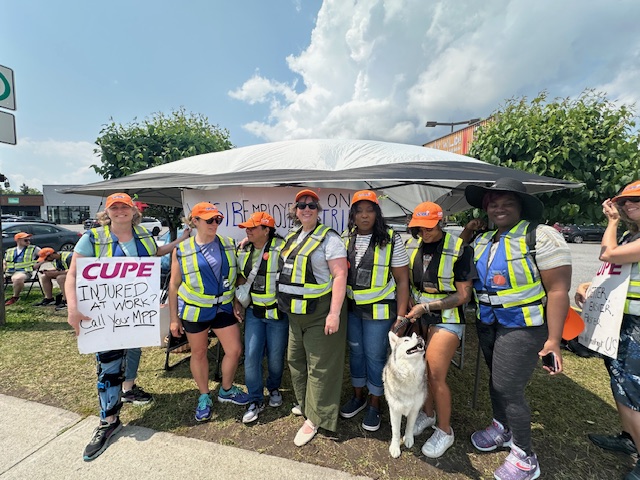One in five employees at Quadra Chemicals is involved in the formation of the company’s safety strategy. As members of either the local joint health and safety committee or the national safety steering committee, these workers are directly involved in determining the company’s safety priorities.
“The big thing here is it’s not one senior person sitting in a room dictating what it’s going to be. It’s everybody in a participatory dialogue,” says Walter Banas, regulatory affairs manager at the Burlington, Ont.-based company, which has 250 employees.
High-risk positions at the chemical distributor have an extensive onboarding program that can take up to one year to complete. When an operator is hired to work in the warehouse where he will be handling dangerous chemicals, he goes through a training matrix “before he touches anything,” and then he is handed off to a senior person who acts as a mentor, says Dan Riddell, regional operations manager.
“He makes sure he knows his procedures, he knows how to handle it safely, knows his proper PPE and all the other procedures that fall in behind it before we let him loose,” he says. “It’s a high-risk, high evaluation process.”
Near misses are inputted through Quadra’s service level improvement program (SLIP) that is used for all company issues, whether it be safety, distribution, environmental or customer related. This one-stop-shop has contributed to great participation from employees, says Banas.
The system is set up to facilitate information-sharing between all sites. When someone puts a near miss into the system, a message pops up on all managers’ computers. As the issue is investigated and corrective action taken, new messages are sent out with updates. And the system even sends out reminders if a problem remains unresolved for too long.
The company’s “no blame” culture is also a critical component of the success of this program.
“You can stop somebody, enter a SLIP and there’s a corrective action item to correct it, but you’re not blaming,” says Riddell. “Put in a near miss, move on, we’ll learn something from it.”
Quadra’s propensity towards auditing sets it apart from the rest. Before the company initiates any commercial activity of a product it undergoes a “very rigorous” review regarding how it can be safely manipulated and transported, says Nawrin Kareem, regulatory affairs co-ordinator. It then conducts regular internal audits to make sure employees are handling the products safely and to determine if they need any additional training.
Quadra also participates in several external audits as a member of the Canadian Association of Chemical Distributors. This allows the company to determine how its safety management system measures up and find any gaps that need to be filled.
“It sounds strange, but we welcome audits,” says Riddell. “We learn from them, so whether it’s an internal audit, external audit, third-party audit, we welcome them.”
“The big thing here is it’s not one senior person sitting in a room dictating what it’s going to be. It’s everybody in a participatory dialogue,” says Walter Banas, regulatory affairs manager at the Burlington, Ont.-based company, which has 250 employees.
High-risk positions at the chemical distributor have an extensive onboarding program that can take up to one year to complete. When an operator is hired to work in the warehouse where he will be handling dangerous chemicals, he goes through a training matrix “before he touches anything,” and then he is handed off to a senior person who acts as a mentor, says Dan Riddell, regional operations manager.
“He makes sure he knows his procedures, he knows how to handle it safely, knows his proper PPE and all the other procedures that fall in behind it before we let him loose,” he says. “It’s a high-risk, high evaluation process.”
Near misses are inputted through Quadra’s service level improvement program (SLIP) that is used for all company issues, whether it be safety, distribution, environmental or customer related. This one-stop-shop has contributed to great participation from employees, says Banas.
The system is set up to facilitate information-sharing between all sites. When someone puts a near miss into the system, a message pops up on all managers’ computers. As the issue is investigated and corrective action taken, new messages are sent out with updates. And the system even sends out reminders if a problem remains unresolved for too long.
The company’s “no blame” culture is also a critical component of the success of this program.
“You can stop somebody, enter a SLIP and there’s a corrective action item to correct it, but you’re not blaming,” says Riddell. “Put in a near miss, move on, we’ll learn something from it.”
Quadra’s propensity towards auditing sets it apart from the rest. Before the company initiates any commercial activity of a product it undergoes a “very rigorous” review regarding how it can be safely manipulated and transported, says Nawrin Kareem, regulatory affairs co-ordinator. It then conducts regular internal audits to make sure employees are handling the products safely and to determine if they need any additional training.
Quadra also participates in several external audits as a member of the Canadian Association of Chemical Distributors. This allows the company to determine how its safety management system measures up and find any gaps that need to be filled.
“It sounds strange, but we welcome audits,” says Riddell. “We learn from them, so whether it’s an internal audit, external audit, third-party audit, we welcome them.”





